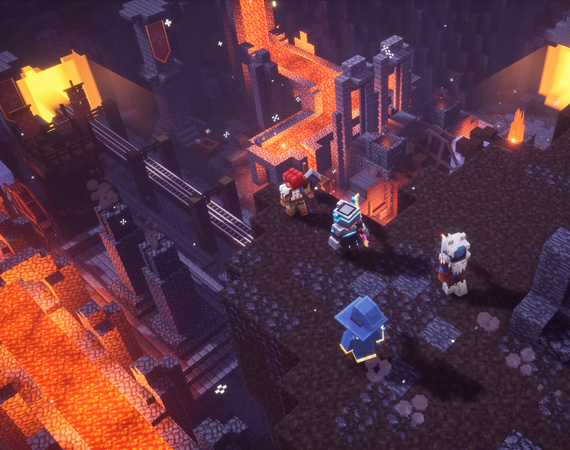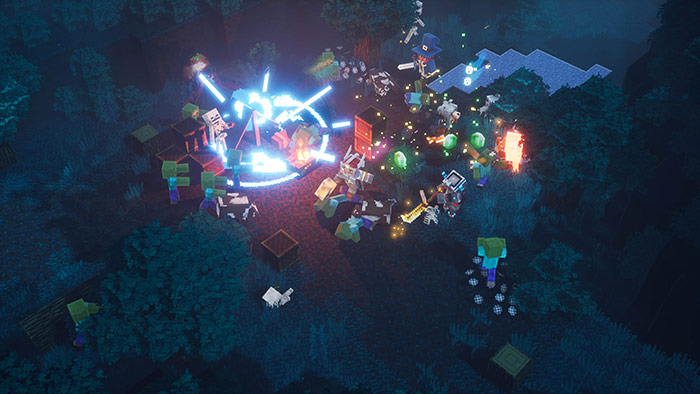
Minecraft is one of the most popular games on the planet, so it’s natural that Microsoft, after buying creator Mojang some years back, would attempt to apply the genre’s playful, blocky aesthetic to other genres. After modest success with the Story Mode adventure game and Pokémon GO-like Minecraft Earth, they’ve tried their hand at a light action-RPG à la Diablo — and unfortunately come up rather short. For now, that is.
Minecraft Dungeons is a sort of my-first-dungeon-crawler type game, a friendly, streamlined version of the genre Diablo created where players enter a procedurally created dungeon or region, kill some monsters, get some loot, make it out alive and do it all over again.
That’s the idea in this game as well, but of course the whole thing uses the block-based look and feel of Minecraft. As you travel through different biomes to free villagers, destroy ancient forges and so on, everything from the levels and monsters to equipment and potions looks like it came straight out of the original game. They nailed the look perfectly.
It’s refreshing, because games like this tend to court a rather grim aesthetic, and when it comes to gameplay they pile on features and mechanics until it feels more like you’re playing a spreadsheet than a game. It’s clear from the start Minecraft Dungeons was intended to provide the fun of fighting, upgrading and exploring without the overly complex and dark trappings of the genre.

For instance, instead of having a handful of character classes each with their own skill tree, everything your character can do depends on their equipment. Weapons, armor and accessories all have unique bonuses and abilities. So if you want to be a bow and arrow-type fighter, wear the Ranger armor that gives you extra-ranged damage and ammo, and use accessories that empower your arrows. Want to be a melee guy? There’s armor and swords for that too.
Customization of your play style, an important part of these games, is achieved by judicious choice of a set of random upgrades on each item. When you gain a level, you get a point that can be used to activate, say, a passive ability that deflects enemy projectiles 20% of the time. Then it costs two points to upgrade it again, so it deflects 30% of the time.
You get those points back when you trash the item and can reapply them to a new one, providing low-risk, low-commitment progress — in time you’ll have lots of points banked to upgrade and experiment with whatever new item you find.
This approach is really a breath of fresh air after the convoluted overlapping systems of the likes of Diablo, Grim Dawn and Path of Exile. There was just the right amount of “this new sword is tempting but do really I want to recycle my old one?” tension, and although you will collect trash loot, it’s easy to check and dispose of.
I didn’t get a chance to test multiplayer, but the game is definitely designed with co-adventuring in mind. Couch co-op lets you drop in a second player with a controller or connect online with others on the same platform (cross-play is coming soon). A cross-platform casual dungeon crawler is something I’ve been wanting for a long time.

It’s too bad, then, that this is where the game runs out of really positive qualities. I’m keeping in mind that this is a $20 game designed with players new to the genre in mind — not to say kids exactly — so there’s no sense comparing it directly to a major mainstream gaming franchise. But even so, Minecraft Dungeons has some serious issues.
For one thing, it really needs more variety. Part of the fun of these games is traveling from region to region and fighting new types of monsters with different tactics and abilities. That really just isn’t there in this game. The 10 different areas are visually distinct, yes, but they’re linear, similar from one run to another, and don’t differ all that much gameplay-wise. One aspect of Minecraft I’ve always loved, exploration, is nearly absent. Getting up on a hill or down in some little valley or cavern you can see usually isn’t possible — they’re just walls or bottomless pits. Side paths often run quite a distance, but I eventually learned to stopped taking them because they were frequently empty and it always took forever to backtrack afterwards.
You’ll run into the same zombies, spiders and soldiers over and over, and get the same weapons and accessories dropped over and over, often with very similar stats. Although there seems to be a good variety at first, the abilities and weapons don’t seem particularly well-balanced, with some obviously and objectively better than others. Some are basically useless: One ability gives you a speedup for a few seconds after you dodge — but the game also slows you down for a few seconds after you roll, so they kind of just cancel each other out. Another returns a third of one percent of your health for every 100 blocks you uncover in the game. What?
This wouldn’t be an issue if the game had better difficulty tuning. I found in my playthrough that there was no challenge whatsoever 99% of the time, and then suddenly a situation would arise where I would be nearly instantly killed. These weren’t lesson-teaching deaths like other games — just sudden confluences of bad luck and, it must be said, some poor design.
Ranged attacks from enemies will often come from off-screen, for instance. And not just a stray arrow, but many simultaneously. Enemy projectiles also go through all other enemies, unlike your own, and are very difficult to dodge, especially when there are a dozen coming from different angles. So sometimes after spending the whole level barely taking a hit, you’re reduced to an emergency situation in a fraction of a second, with very little warning, by enemies you haven’t had a chance to react to or perhaps even see. The close-zoom camera shows details well but limits your understanding of what’s happening around you.

These brutal difficulty spikes aren’t always accidental. One enemy kept popping up that repeatedly spawned huge numbers of bear traps under my character’s feet that closed before any but a really expert player could be expected to dodge. Bosses are cheap, swarming players with minions, storms of enormous projectiles, and instant, undodgeable melee attacks.
The issue here isn’t just that it’s hard, but that the game doesn’t give you the tools you need to deal with it. Dodging feels clumsy and enemies block your movement; there is little in the way of active defense like a shield or accessory you activate to repel arrows for 5 seconds; you only have one slowly recharging healing potion and health doesn’t trickle back, so little mistakes add up over time. Not that it matters, since punishment is usually swift and extreme.
What all this amounts to is a game that alternates between monotonous and frustratingly hard, even for a fan of the genre like myself. And considering you’ll run through all the areas in the game in a handful of hours — there are 10 areas, each of which takes perhaps 20 minutes to clear — it’s expected that you’ll repeat them over and over to reach the gear level required to beat the final boss. I got all the way to that point and was insta-killed twice in a row.
I repeated a few areas but found them nearly indistinguishable from their earlier iterations. Ultimately I just wasn’t motivated to grind away just so I could unlock another, likely even more unfair, difficulty level.
I wouldn’t complain so much if this wasn’t, ostensibly, a game for beginners. Minecraft Dungeons innovates and simplifies in some really laudable ways, but the moment-to-moment game design is too uneven and the variety on offer isn’t enough even for a $20 game.
But it must be said that Minecraft itself also started out rather bare-bones and was built up over time into something remarkable and almost infinite. There are two DLC packs in the works for Dungeons, one rather crassly visible from the very start — nothing like being asked to pay more for a game you just bought. The good news is these packs will grow the game to a size that feels more like an adventure and less like a demo. I also expect that patches over the coming weeks and months will considerably tweak the equipment and difficulty — it can be, and needs to be, fixed.
A year from now Minecraft Dungeons could very well be a no-brainer purchase, a cross-platform casual hack-and-slash that you can play with your kids or your friends and have a great time without thinking too hard about it (or opening Excel). But right now it’s mostly potential. I’d hold off on picking this one up until it has been made into the game it’s meant to be.

